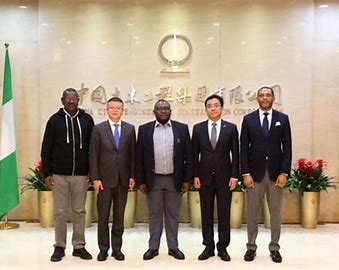FG Sign Massive $328.8 Million Power Deal with China.
FG Sign Massive $328.8 Million Power Deal with China.
By Achimi Muktar
In what could be a game-changing move for Nigeria’s power sector, the Federal Government has inked a $328.8 million deal with Chinese engineering giant, China Machinery Engineering Corporation (CMEC), to overhaul and expand the nation’s electricity transmission network.
Signed on Wednesday in Abuja, the high-stakes agreement marks Phase 1 of the ambitious Presidential Power Initiative (PPI), a multi-pronged effort aimed at revitalizing Nigeria’s fragile energy infrastructure. This new phase is expected to deliver a massive 544 kilometres of 330kV and 132kV transmission lines—capable of handling 7,140 megawatts of electricity—across various locations nationwide.
The contract encompasses Engineering, Procurement, Construction, and Financing (EPC+F) services, and will be implemented under the supervision of FGN Power Company, a special purpose vehicle created to drive the PPI.
At the signing ceremony, Minister of Power, Adebayo Adelabu, painted a hopeful picture. “This project is not just about cables and towers—it’s about transforming lives, powering industries, and setting Nigeria on a new path of economic growth,” he declared.
Adelabu emphasized that the upgraded transmission infrastructure would address long-standing inefficiencies that have left large volumes of generated electricity stranded and undelivered. “Without an efficient transmission backbone, our generation capacity means little to the man on the street,” he added.
The deal also signals a deepening relationship between Nigeria and global partners committed to supporting the country’s energy goals. CMEC, a subsidiary of SINOMACH, will bring its world-renowned technical prowess to bear on the project. Speaking at the event, Li Xiaoyu, Vice President of SINOMACH, expressed gratitude to the Nigerian government for its trust. “We are honoured to be part of this historic transformation. CMEC is committed to delivering world-class infrastructure to Nigeria,” he said.
Kenny Anuwe, Managing Director of FGN Power Company, called the partnership a “strategic leap” in Nigeria’s power journey. He noted that CMEC’s involvement would complement existing collaborations with Siemens Energy, which is already working on generation and high-voltage transmission components under the PPI.
For millions of Nigerians plagued by decades of erratic power supply, this development offers a glimmer of hope. If executed effectively, it could mark the beginning of a new era—where stable, reliable electricity is no longer a dream but a national reality.
Could this finally be the spark that lights up Nigeria? Only time will tell. But for now, the nation watches—and waits.





















